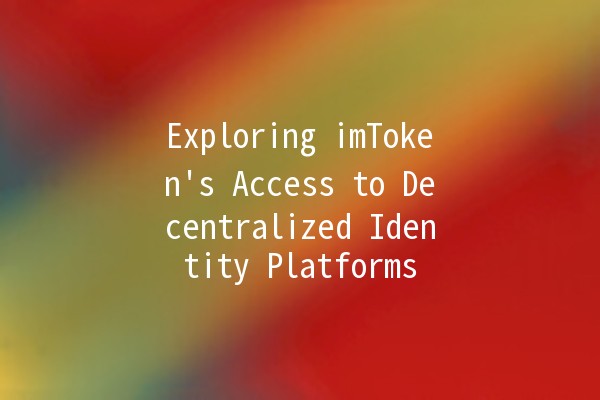In an era where digital identity and data privacy have become paramount, the concept of decentralized identity platforms is gaining traction. Among these platforms, imToken stands out as a significant player, providing users with both security and convenience in managing their digital identities. This article aims to delve into how imToken facilitates access to decentralized identity solutions, empowering users to take charge of their digital identities seamlessly and securely.

Decentralized identity (DID) refers to a system where individuals can own and manage their digital identities without relying on a central authority. Traditional identity systems often require users to trust thirdparty entities to verify their information. With DID, individuals have control over their personal data, sharing it only when necessary while maintaining privacy and security.
SelfSovereignty: Users have full ownership of their identities.
Privacy: Personal information can be disclosed selectively.
Interoperability: DIDs can be used across various platforms and services.
In the context of imToken, the platform utilizes blockchain technology to facilitate secure and efficient access to decentralized identities.
imToken is a leading cryptocurrency wallet that supports various blockchain assets and has integrated functionality for accessing decentralized identity solutions. This integration allows users to easily manage their digital identities while ensuring security through cryptographic measures.
Example: A user can store their verified credentials, such as certifications or awards, directly in their imToken wallet, minimizing the need to share sensitive information with third parties.
Example: Users applying for online services requiring identity verification can use their imToken wallet to share only the necessary information, enhancing privacy and reducing the potential for identity theft.
Example: Instead of entering multiple passwords for different platforms, users can authenticate themselves using their imToken wallet, streamlining access to various services.
Example: Users can access decentralized finance (DeFi) platforms while using their credentials stored in imToken, making investments or transactions simpler.
Example: If a user no longer needs to share their identity with a particular service, they can easily revoke permissions through the imToken interface, enhancing their privacy.
Utilizing imToken to its fullest potential requires users to adopt strategies that enhance productivity. Here are five practical tips to help users make the most of imToken's capabilities:
Description: Maintain a clear, categorized view of identity credentials within imToken.
Application: Users can create different folders for various types of credentials (e.g., educational, professional, personal) for quick access during verification processes.
Description: Enable notifications for updates related to identity protocols or credential expirations.
Application: Users can receive alerts regarding necessary updates or renewals, ensuring they stay compliant and uptodate with their digital identities.
Description: Explore decentralized applications that simplify the management of digital identities.
Application: Regularly interact with dApps that integrate with imToken to discover new features, such as automated credential sharing or bulk verification processes.
Description: Conduct periodic reviews of shared identity credentials to enhance privacy.
Application: Users should assess which services currently have access to their credentials and revoke any unnecessary permissions.
Description: Keep an eye on new features released by imToken and related protocols.
Application: Users can take advantage of updated functionalities and enhanced security measures, ensuring they are using cuttingedge technology to manage their identities.
imToken is a cryptocurrency wallet that allows users to manage various digital assets and access decentralized identity platforms. It provides secure storage, easy access to digital assets, and integrates with various decentralized applications.
Decentralized identity allows users to own and control their identities without a central authority. In contrast, traditional identity management relies on thirdparty institutions to verify and store user information.
Yes, imToken supports the management of multiple digital identities. Users can categorize and store various credentials within the wallet, allowing for seamless switching between identities when needed.
imToken employs advanced cryptographic methods to secure user information. Personal data stored within the wallet remains private and is only shared at the user’s discretion.
Users can explore various dApps available in the imToken ecosystem that support seamless integration. By connecting their wallet to these dApps, users can manage their identities and assets effectively.
If you forget your imToken wallet password, you can recover access through their recovery options if you have previously enabled them, such as seed phrases. Always ensure to store recovery information securely.
The importance of decentralized identities is more crucial than ever. With platforms like imToken leading the charge, users can manage their digital identities with unprecedented ease and security. By leveraging the tips and insights shared in this article, users can enhance their experience, boost productivity, and take full control of their digital identities in a rapidly evolving digital landscape. 🌟